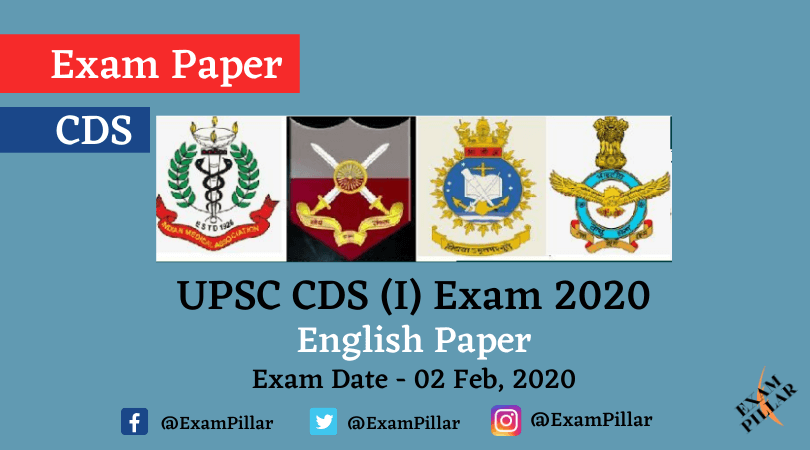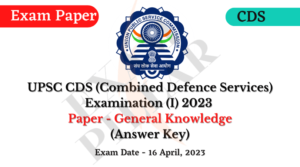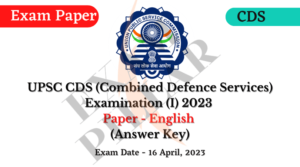UPSC (Union Public Service Commission) conduct the CDS (Combined Defence Services) I Exam – 2020. CDS I 2020 Paper held on 02 February 2020. This paper is English Section. UPSC CDS (I) 2020 English Paper Answer Key available here.
Exam – UPSC CDS (I) 2020
Organized by – UPSC
Subject – English
Date of Exam – 02nd February, 2020
Number of Question – 120
UPSC CDS (I) Exam 2020 Paper
Subject – English
(Answer Key)
COMPREHENSION
Directions : In this section you have a few short passages. After each passage, you will find some items based on the passage. First, read a passage and answer the items based on it. You are required to select your answers based on the contents of the passage and opinion of the author only.
Passage – I
Not all agricultural societies become civilizations, but no civilization can become one without passing through the stage of agriculture. This is because at some stage in the development of agriculture, as productivity improves, not all people would need to be engaged in producing or procuring food. A significant number of people could be freed up to pursue other activities such as building walls or monuments for new cities; making new tools, weapons and jewellery; organizing long-distance trade; creating new artistic masterpieces; coming up with new inventions; keeping accounts; and perhaps constructing new public infrastructure such as irrigation canals that further improve the productivity of agriculture, thus realizing even more people to do new things.
This can happen, of course, only if a society that has transitioned to high-productivity agriculture has also, at some stage in its evolution, found a way to channel the bonanza of free time into other work fruitfully. In the ancient world, this often involved creating new ideologies and new hierarchies or power structures to coerce or otherwise convince large groups of people to devote their time to the new tasks for very little reward.
1. Which one of the following statements is true according to the author ?
(a) Agriculture has always been part of all civilizations.
(b) Not all civilizations have undergone the processes of agriculture.
(c) Agriculture gave birth to new civilizations.
(d) Communities discontinued agriculture to become civilizations.
Show Answer/Hide
2. A significant number of people were sent to carry out other work from agriculture because
(a) there were insufficient agricultural products.
(b) people were needed to build monuments, weapons, jewellery, etc.
(c) there were sufficient agricultural products.
(d) this enabled the development of civilizations.
Show Answer/Hide
3. What kind of agriculture based societies would emerge as civilizations ?
(a) Societies which achieved high productivity in agriculture had the opportunity to find time for other work.
(b) Societies which depended on agriculture completely moved to other fruitful work so as to move to many places.
(c) Societies which transitioned from one stage of agriculture to another.
(d) Societies which could not do agriculture for lack of resources moved to other work.
Show Answer/Hide
4. People as groups were convinced to do new work through
(a) reward, force and community persuasions.
(b) ideologies, hierarchies and power structures.
(c) excessive agricultural products.
(d) very high rewards.
Show Answer/Hide
5. the passage means Which word in ‘changeover’?
(a) Transitioned
(b) Channel
(c) Coerce
(d) Hierarchies
Show Answer/Hide
Passage – II
When we pick up a newspaper, a book, or an article, we come to our task with certain preconceptions and predispositions. We expect to find a specific piece of information or be presented with an argument or an analysis of something, say, the likelihood of recession in the next six months or the reasons why children can’t read. We probably know a little about the book or article we are reading even before we start. There was, after all, some reason why we chose to read one piece of writing rather than another.
Our expectations and predispositions may, however, blind us to what the article and its author is actually saying. If, for example, we are used to disagreeing with the author, we may see only what we expect to see and not what is actually there. Day after day in our routine pattern of life we expose ourselves to the same newspaper, the same magazine, even books by authors with the same perspectives. In order to reflect on our reading habits and improve our skills we need to break out of this routine, step back and look at what we are doing when we read.
6. According to the author, which one of the following statements is not true ?
(a) Reader’s preconceptions influence their reading
(b) Readers have expectations when they read an article or a book.
(c) Readers look for specific information in any of their readings.
(d) Readers assume that everything they read will have new information.
Show Answer/Hide
7. Our expectations and predispositions may, however, blind us because
(a) we may not get the actual ideas of the author.
(b) we will get the actual ideas of the author.
(c) we may disagree with the author.
(d) we will agree with all the ideas of the author.
Show Answer/Hide
8. One of the ways to improve our reading habits is to
(a) break the routine by changing the time of reading.
(b) change the types of topics we read.
(c) break the routine of reading the same newspaper
(d) stop reading for some time and then restart reading.
Show Answer/Hide
9. Which quality does the author here advocate, to be a good reader ?
(a) Being objective to the ideas of the author
(b) Having preconceptions and predispositions
(c) Having continuous routines
(d) Disagreeing with the author
Show Answer/Hide
10. Which word in the passage means ‘viewpoints’?
(a) Preconceptions
(b) Predispositions
(c) Pattern
(d) Perspectives
Show Answer/Hide
SPOTTING ERRORS
Directions: Each item in this section has a sentence with three underlined parts labelled as (a), (6) and (c). Read each sentence to find out whether there is any error in any underlined part and indicate your response on the Answer Sheet against the corresponding letter i.e., (a) or (b) or (c). If you find no error, your response should be indicated as (d).
11. After mysteriously expanding for decades, (a)/ Antarctica’s sea ice cover (b)/ starting melting. (c)/ No error (d)
Show Answer/Hide
12. The auction, conducted by the bank, (a)/ will be price based (b)/ using multiple priced method. (c)/ No error (d)
Show Answer/Hide
13. If the scheme would have been implemented effectively (a)/ all affected (b)/ would have benefitted. (c) / No error (d)
Show Answer/Hide
14. Government Stock offers (a)/ safety, liquidity and attractive returned (b)/ for long duration. (c) / No error (d)
Show Answer/Hide
15. Scrolling thorough my social media timeline, (a) / I hovered over a video (d) / of a minor road traffic accident. (c) / No error
Show Answer/Hide
16. The fascination with gold at least (a) / seems to be a case were traditional belief and (b) / modern finance would point the same way. (c) / No error (d)
Show Answer/Hide
17. Evolutionary biology leave us (a) / distinctly pessimistic about the possibility (b) / that altruism can arise naturally among humans. (c) / No error (d)
Show Answer/Hide
18. When everything starts working for you, (a) / you will find (b) / things are achieve and delivered. (c) / No error (d)
Show Answer/Hide
19. If I were you (a) / I would not go for (b) / change of job. (c) / No error (d)
Show Answer/Hide
20. At the beginning of the nineteenth century, (a) / female literacy was extremely lowed (b) / in comparison to male literacy. (c) / No error (d)
Show Answer/Hide




Your solutions are not right.Please correct it.
YES! exactly… i was thinking the same…